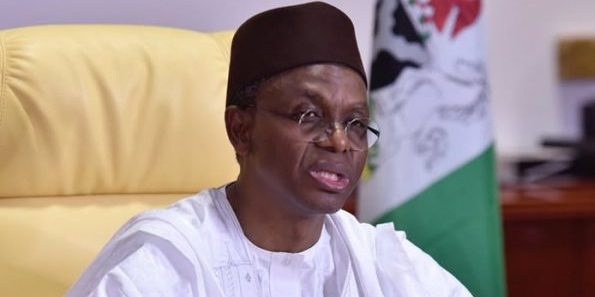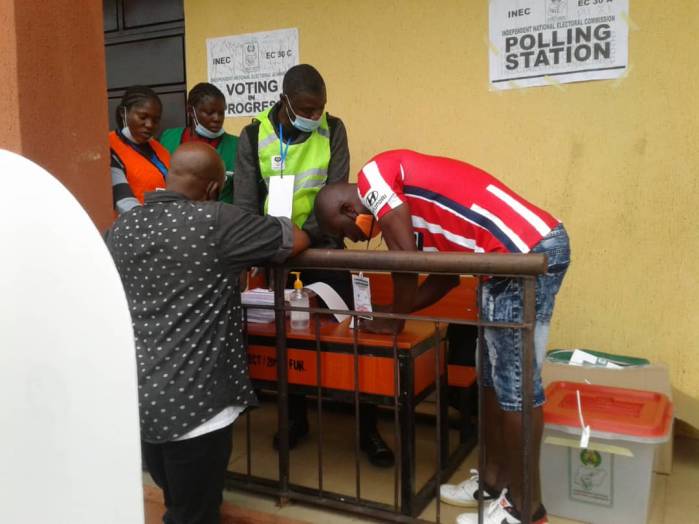Farmers from Southern Kaduna have vowed to resist attempts by the Governor, Nasir El-Rufai, to give their 2,500 hectares farmland to a private investor, Vicampro Farms.
The farmers said they will not surrender the defunct Manchok Cattle Ranch to the private firm while Mr. El-Rufai was assisting farmers in Northern Kaduna to cultivate their land.
Representatives of the farmers made their feelings known in a statement on Saturday.
Those who signed the document include: Zacharia Musa from Makabun community, Thomas Swanta from Madamai community and Stephen Mamman Bobai from Jankasa community
Others are David Duniya Adams from Watyap community and Emmanuel Jonah Duniya.
The Manchok Cattle Ranch is a very fertile farmland which straddles parts of Zangon Kataf and Kaura local government areas of the state.
But the farmers accused the government of land grabbing under the guise of attracting investment to the area.
They also vow the resist the plan by the state government to pay them between N300 to N1000 as compensation for their land.
After series of meetings with the government, including the Kaduna Geographical Information System (KADGIS), the representatives of the farmers said they drew attention to how the government has assisted farmers in Northern Kaduna.
“We reminded them that in Hunkuyi in Kudan Local Government in the northern part of the state, this same government had provided a dam for farmers, their lands were prepared with government money; the farmers were organized into cooperatives and 96 percent of the Hunkuyi potato farmers have access to agricultural loans and are cultivating their own farmlands,” the statement read.
“People from Lagos, Kano, Plateau, FCT, Sokoto etc., go to Hunkuyi to buy their potatoes. We also reminded them that the Federal Government made available N15 billion to Kebbi farmers to produce Rice on their own farmlands and did not bring a private investor to take their lands and use the N15 billion to employ the owners of the land as labourers.
“When we asked them why is Vicampro brought to take our lands, use the N45billion federal money to employ us as labourers on our ancestral lands, they could not give us an answer,” the farmers said.
Instead of taking over their farms and employing them as labourers, the farmers said Vicampro should provide technical support and inputs to local farmers and buy off the potatoes to be cultivated.
“Quaint Solar Energy is claiming a Certificate-of-Occupancy (C-of-O) over 300 hectares of the land,” the statement further read.
“It would look like both companies negotiated with the Chief of Moroa, His Roya Highness, Tagwai Sambo, unknown to the landowners, while sourcing for the vast land which, according to the CPCC, the revered chief did not have “even a square inch.”
The farmers said the two companies were misled to think there was no need to get the landowners involved in the negotiation, not knowing that no chief in Southern Kaduna has rights over other people’s lands.
They argued that land was leased to the Northern Nigerian Government in 1962 for a cattle fattening ranch.
At the time, they said only a few persons in the affected communities were paid a paltry sum which they claimed totalled N2, 700.
They listed communities whose indigenes owned portions of the land in the ranch as Makwakhwu, Magatah,Jankasa and Kangwaza in Atyap Chiefdom; Mafok, Madamai and Makabun in Kagoro Chiefdom.
Others are Watyap (Kaura), Gizagwai, Mahuta and Kajim in Moro’a Chiefdom.
“Manchok did not and does not own an inch of the land in the defunct Manchok Cattle Ranch,” the representatives of the farmers insisted.
“The office of the ranch was in Kaura village (Watyap) which was then under the old Manchok District; hence the name ‘Manchok’ was given the ranch for easy identification.”
The farmers said with no compensation paid the 372 families that owned the land; the owners reclaimed their lands until 1988 when the government of Gen. Ibrahim Babangida leased it to Adamu Dankabo.
“All the communities rose up in opposition insisting that it was the only prime it had left for farming. Dankabo left the land, stating that the communities did not want the land sold to his company, Kabo Holdings,” the statement read.
“Thereafter, the communities fully took over their lands in the defunct cattle ranch to cultivate their farms. Land conflicts over farmland drastically reduced and harmonious relations were returned between various communities in the area who are facing even as at then, serious arable land shortages,” the farmers said.
According to the farmers, a new attempt to take their land started in 2013 when an old administrative map of Moroa Chiefdom under which Kaura (Watyap) lands fell under the administration of Manchok District surfaced.
They, however, noted that Kaura is a District of its own and was not under Manchok.
According to them, Quaint Solar is currently planting its solar panels in Kaura (Watyap land) but erroneously claiming it is in Manchok.
“We are not ready to let go our farmlands in communities where we live to be used to plant solar panels. We know the health implications,” the farmers continued.
“We don’t want to sale such arable lands. And we not going to allow anyone take it with state might and give to a private company for the sole purpose of making private profit.
“We are ready to give alternative lands that are not cultivable for such a venture as is practised all over the world,” the farmers said.
Based on findings, the farmers said Quaint does not have the funds to prosecute the 50 megawatts solar plant project and wanted to use the C-of-O of the allocated land as collateral to secure a grant from a US funding agency.
The farmers expressed disappointment over the planned payment of between N300 to N1000 as compensation to landowners by solar energy firm.
The farmers continued, “In 2016 alone, many young farmers made between N2 million and N6 million each farming potatoes, yam, ginger, maize, tamba on the defunct ranch.
“The larger cultivators earned much larger profits from their farming businesses on that land. These are the people that the government and its private collaborators want to pay N600 compensation.”
They also dismissed the Environmental Impact Assessment (EIA) submitted by Quaint, in which it said the people of Kaura were 98 percent Hausa/Fulani Muslims, saying it was evident the owners of the company were not serious investors but land grabbers.
The farmers insisted the people of Kaura are 90 percent Atyap and 100 percent Christians.
Already, they said farmers in the area have formed cooperatives to produce ginger, soya beans and maize under the Federal Government-funded Anchor Borrowers Scheme.
On January 6, the state Deputy Governor, Barnabas Bantex, had at the Maroa Cultural Festival in Manchok, accused some elites of blocking government’s effort to develop the area.
Mr. Bantex had in his address at the event said the El-Rufai-led government brought Vivampro Farms Limited to commercially cultivate potatoes and Quaint Solar Energy Limited to produce 50 Megawatt of electricity on the defunct ranch.
He, however, blamed “selfish” elites from the area for frustrating the project, thus denying the area of development.
“The government will no longer tolerate any of such actions,” Mr. Bantex had warned.











